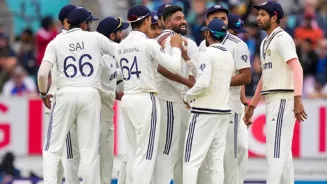India and England concluded their five-match Test series in 2025 with an exciting 2-2 draw, decided by an unforgettable final Test at The Oval.
After a
see-saw battle across the series, in the decisive match, India clinched a narrow six-run victory to equalize the series. England initially appeared on course for a historic win while chasing 374, reaching 301-3 with centuries from Harry Brook and Joe Root. However, India produced a stunning comeback, led by an exceptional bowling display from Mohammed Siraj, who claimed five critical wickets on the last day. Prasidh Krishna also played a vital role by taking important wickets. England's batting fell apart, losing their final seven wickets for just 66 runs.
The finish was dramatic as injured Chris Woakes bravely took the crease with a dislocated shoulder but didn't face a ball before Siraj dismissed Gus Atkinson to end the game. This marked India's first-ever Test win at The Oval and their largest away victory by runs, strengthening their position in the ICC World Test Championship and creating one of the most thrilling conclusions in recent Test cricket.
And as the first assignment of this new India concludes, here are four things we have learned from the inaugural edition of the Anderson-Tendulkar trophy.
Shubman Gill's India has Grit
Leading the team in his first Test series as captain, Shubman Gill excelled both as a leader and batsman, scoring a phenomenal 754 runs in 10 innings with four centuries. His run tally broke longstanding Indian records and was second only to Don Bradman for most runs by a captain in a series. Importantly, Gill achieved this while India played without former stalwarts Rohit Sharma and Virat Kohli, signaling a clear shift to a new generation taking charge under his captaincy.
However, make no mistake, this new and young team possesses resilience and grit, which has been evident throughout the series. From the Manchester stalemate to Oval's epic win, India have taken a few leaps forward, and Gill will be hoping to leverage that and get inspired by this in the coming years.
Mohammed Siraj is no longer a deputy
Mohammed Siraj emerged as a key spearhead of India's pace attack, especially in the thrilling final Test where his incisive bowling spell dismantled England's hopes. Taking nine wickets in the final innings alongside Prasidh Krishna, Siraj proved he can lead the attack and perform under pressure, shedding his earlier role as a backup bowler to become a frontline wicket-taker and match-winner. Over the series, the India pacer has emerged as the highest wicket-taker with 23 scalps to his name.
But the biggest positive for Siraj has been his emergence as the main cast of the drama. Siraj rose to his peak throughout the campaign and managed to showcase his immense quality with the ball. The India pacer may have been taken as a second fiddle to Jasprit Bumrah so far, but not anymore.
Overseas batting is not India's Achilles' heel anymore
The series dismantled the long-held belief that India's batting collapses overseas are inevitable. KL Rahul, Rishabh Pant and Shubman Gill spearheaded India's batting, and the trio stood tall in adverse situations. India recorded most boundaries by a team in the series, racked up a total of 12 centuries in five matches, which is a new record for any touring Indian team. India captain Gill amassed 754 runs in the series, the most by an Indian captain at an away Test series.
Apart from that, four India batters scored more than 450 runs in the series, a very first for the Indian team. The run-scoring machines are - Shubman Gill (754), KL Rahul (532), Ravindra Jadeja (516) and Rishabh Pant (479).
Ravindra Jadeja's batting Renaissance
With Ravindra Jadeja nearing the end of his illustrious career, the India all-rounder showcased a magnificent batting display in the series. Jadeja scored 516 in the series, with an average of 86 in the five matches. The southpaw hit 5 fifties and also decorated his outing with a stunning hundred in Manchester, signifying his immense quality with the bat. The 36-year-old reinvented his credentials with the bat and is expected to play a bigger role in the coming assignments of the current WTC cycle.
In the Indian conditions, Jadeja is a lethal weapon with the ball, and now in overseas English conditions, Jadeja emerged with the bat, thus reiterating his elite all-rounder status yet again.














